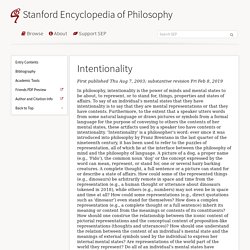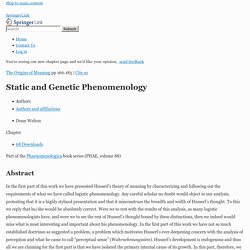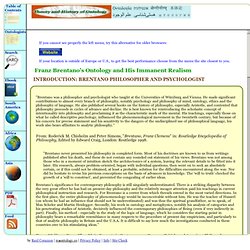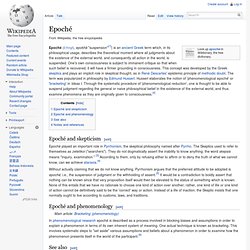

Intentionality. 1.

Why is intentionality so-called? Contemporary discussions of the nature of intentionality are an integral part of discussions of the nature of minds: what are minds and what is it to have a mind? They arise in the context of ontological and metaphysical questions about the fundamental nature of mental states: states such as perceiving, remembering, believing, desiring, hoping, knowing, intending, feeling, experiencing, and so on. What is it to have such mental states? How does the mental relate to the physical, i.e., how are mental states related to an individual's body, to states of his or her brain, to his or her behavior and to states of affairs in the world?
Why is intentionality so-called? Although the meaning of the word ‘intentionality’ in contemporary philosophy is related to the meanings of such words as ‘intension’ (or ‘intensionality’ with an s) and ‘intention,’ nonetheless it ought not to be confused with either of them. 2. 3. Lionel Jospin is a Socialist. 4. 5. 6. 7. 11a. Static and Genetic Phenomenology. Part of the Phaenomenologica book series (PHAE, volume 88) Abstract In the first part of this work we have presented Husserl’s theory of meaning by characterizing and following out the requirements of what we have called logistic phenomenology.

Any careful scholar no doubt would object to our analysis, protesting that it is a highly stylized presentation and that it misconstrues the breadth and width of Husserl’s thought. To this we reply that he/she would be absolutely correct. Were we to rest with the results of this analysis, as many logistic phenomenologists have, and were we to see the rest of Husserl’s thought bound by these distinctions, then we indeed would miss what is most interesting and important about his phenomenology. Preview Unable to display preview. Copyright information © Martinus Nijhoff Publishers, The Hague 1983 Authors and Affiliations Donn Welton There are no affiliations available. Husserl & the Adventure of Phenomenology - In 12 Minutes. The Husserl Page. Franz Brentano's Ontology and his Immanent Realism.
If you cannot see properly the left menu, try this alternative for older browsers: Mirror Website If your location is outside of Europe or U.S., to get the best performance choose from the menu the site closest to you.

"Brentano was a philosopher and psychologist who taught at the Universities of Würzburg and Vienna. He made significant contributions to almost every branch of philosophy, notably psychology and philosophy of mind, ontology, ethics and the philosophy of language. He also published several books on the history of philosophy, especially Aristotle, and contented that philosophy proceeds in cycles of advance and decline. From: Roderick M. "Brentano never presented his philosophy in completed form. Brentano's significance for contemporary philosophy is still singularly underestimated. From: Wolfgang Stegmüller, Main Currents in Contemporary German, British, and American Philosophy, Dordrecht: Reidel Publishing Co., 1969, p. 24.
Epoché. Epoché and skepticism[edit] Epoché played an important role in Pyrrhonism, the skeptical philosophy named after Pyrrho.

The Skeptics used to refer to themselves as zetetikoi ("searchers"). They do not dogmatically assert the inability to know anything: the word skepsis means "inquiry, examination. " [3] According to them, only by refusing either to affirm or to deny the truth of what we cannot know, can we achieve ataraxia.[4] Without actually claiming that we do not know anything, Pyrrhonism argues that the preferred attitude to be adopted is epoché, i.e., the suspension of judgment or the withholding of assent.[5] It would be a contradiction to boldly assert that nothing can be known since that very proposition itself would then be elevated to the status of something which is known. None of this entails that we have no rationale to choose one kind of action over another; rather, one kind of life or one kind of action cannot be definitively said to be the 'correct' way or action.
Bracketing and Phenomenological Reduction. BracketingA term used by Edmund Husserl to refer to suspending judgment about the natural world (precedes analysis).

This is written about in bracketing phenomenology on Wikipedia: Bracketing involves setting aside the question of the real existence of the contemplated object, as well as all other questions about its physical or objective nature; these are left to the natural sciences. For example, the experience of seeing a horse qualifies as an experience, irrespective of whether the horse appears in reality, in a dream, or in a hallucination. By bracketing the horse as object of this experience (and, ordinarily, the entire objective world to which the horse belongs if it is real), the phenomenologist puts aside all questions concerning its objective existence or non-existence and considers only the experience that he or she has of it. Empirical subjectivity is suspended by the process of bracketing described above.
Like this: Like Loading... Transcendental Phenomenology. Transcendental phenomenology Basic themes of transcendental phenomenology are “intentionality,” “eidetic reduction,” and “constitution of meaning.”

By transcendental phenomenology we refer primarily to the work of Edmund Husserl and his early assistants Edith Stein and Eugen Fink.